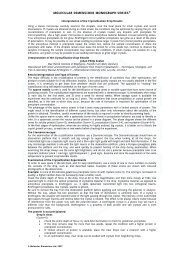(IEA Energy Papers 2011_05) Matthias Finkenrath-Cost and Performance of Carbon Dioxide Capture from Power Generation (IEA Energy Papers)-OECD Publishing (2011)
You also want an ePaper? Increase the reach of your titles
YUMPU automatically turns print PDFs into web optimized ePapers that Google loves.
<strong>Cost</strong> <strong>and</strong> <strong>Performance</strong> <strong>of</strong> <strong>Carbon</strong> <strong>Dioxide</strong> <strong>Capture</strong> <strong>from</strong> <strong>Power</strong> <strong>Generation</strong> ©<strong>OECD</strong>/<strong>IEA</strong> <strong>2011</strong><br />
Page | 40<br />
power plants. It is important to note that in future scenarios with substantial electricity supply by<br />
variable renewable energy, other power generation options – including those with CO 2 capture –<br />
might have to operate at load factors that are significantly lower. Given the sensitivity <strong>of</strong> LCOE to<br />
the capacity factor, this would lead to higher LCOE figures than those provided in the results<br />
section <strong>of</strong> this working paper. In addition, once installed, the marginal operating costs <strong>of</strong> power<br />
plants will play an important role for determining the capacity factor <strong>of</strong> a specific power plant.<br />
Due to higher fuel costs, marginal operating costs <strong>of</strong> natural gas‐fired power plants are <strong>of</strong>ten<br />
higher than those for coal‐fired plans, which could result in lower capacity factors. The sensitivity<br />
<strong>of</strong> LCOE to variations in the capacity factor <strong>and</strong> other key parameter is discussed in the PCGE<br />
2010 publication.<br />
In addition, sensitivities <strong>of</strong> LCOE results <strong>from</strong> this study are illustrated in Figure 6. The vertical axis<br />
denotes the average baseline LCOE result for coal‐ <strong>and</strong> natural gas‐fired power generation with<br />
CCS. The horizontal bars indicate the percentage increase or decrease <strong>of</strong> this value caused by a<br />
±50% variation in the assumptions for fuel cost, O&M, overnight costs <strong>and</strong> discount rate. The<br />
graphs quantify the generally known strong sensitivity <strong>of</strong> LCOE to capital cost related factors such<br />
as overnight costs <strong>and</strong> the discount rate for coal‐fired power generation, <strong>and</strong> fuel cost for natural<br />
gas‐fired power generation.<br />
Figure 6. Impact <strong>of</strong> a ±50% variation in key assumptions on LCOE<br />
Coal‐fired power generation with CCS<br />
Natural gas‐fired power generation with CCS<br />
Fuel cost<br />
O&M<br />
Overnight cost<br />
Discount rate<br />
‐40% ‐30% ‐20% ‐10% 0% 10% 20% 30% 40%<br />
Impact on LCOE<br />
‐40% ‐30% ‐20% ‐10% 0% 10% 20% 30% 40%<br />
Impact on LCOE<br />
In general, CO 2 capture cost estimates published before 2007 are comparably low. While this<br />
coincides with low cost indices for power <strong>and</strong> chemical installations at that time, costs remain<br />
lower than more recent estimates even after updating them to current levels. Hence, simple<br />
recalibration <strong>of</strong> older cost figures <strong>of</strong>ten cannot fully close the gap between older <strong>and</strong> latest cost<br />
estimates for CO 2 capture. Reasons for this difference might include:<br />
<br />
<br />
<br />
Fundamental differences in prices <strong>of</strong> individual core equipment, for example for gas<br />
turbines or other key cost components that are not fully reflected by generalised cost<br />
indices used in this study;<br />
Increased <strong>and</strong> more detailed knowledge about processes <strong>and</strong> required auxiliary<br />
installations leading to higher cost; <strong>and</strong><br />
Changes in pricing strategies by technology providers <strong>and</strong> engineering companies.




